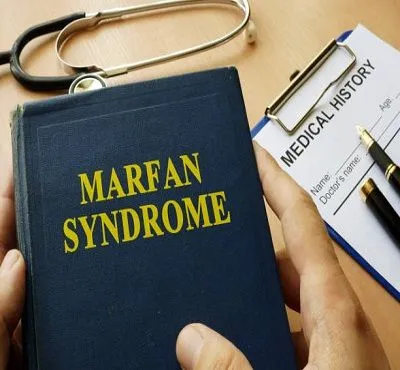We do not request reimbursement of costs
(such as repayment for obtaining medical records)
from veterans nor from people who suffer from multiple sclerosis.
- Call today for a free evaluation
- 1-888-774-7243
Marfan Syndrome
Living with a disability often leads to financial struggles when a person is unable to work. Many of the conditions that render a person unable to work are listed by the Social Security Administration (SSA) as recognized disabilities, but some conditions require sufferers who are living with an unlisted disability to prove that side effects of the condition are severe enough to make it impossible for the person to work. Marfan syndrome is an unlisted condition.
What is Marfan Syndrome?
Marfan syndrome is a disorder that affects the connective tissue in a person’s body. This genetic disorder is very rare, and people who suffer from Marfan syndrome often find that the condition causes complications in various parts of the body. While Marfan syndrome has the ability to affect any organ in the body, heart conditions related to this genetic disorder pose the greatest risk.
People who suffer from Marfan syndrome may struggle with learning disabilities, scoliosis or near-sightedness. These side effects of the condition are often successfully treated by a medical professional. However, heart problems related to Marfan syndrome can lead to an aortic aneurysm that may be exasperated when a sufferer lifts any amount of weight.
Can you get SSD For Marfan Syndrome?
 Social security disability (SSD) benefits are not available to everyone who suffers from Marfan syndrome. Side effects of the disorder must severely limit a person’s ability to complete work tasks for a job for which they are qualified in order for them to be eligible for SSD benefits. People who are unable to lift any amount of weight because of complications of the disorder are likely to be approved for benefits.
Social security disability (SSD) benefits are not available to everyone who suffers from Marfan syndrome. Side effects of the disorder must severely limit a person’s ability to complete work tasks for a job for which they are qualified in order for them to be eligible for SSD benefits. People who are unable to lift any amount of weight because of complications of the disorder are likely to be approved for benefits.
There are two complications of Marfan syndrome that automatically qualify a person for SSD benefits.
1) A person suffers from an aortic aneurysm that results in the separation of the lining of the aorta from the wall of the artery.
2) A person suffers from an aneurysm in the heart that causes ongoing pain or complications.
It is possible for people who do not suffer from these complications to qualify for SSD benefits. The SSA will evaluate an individual’s medical history to determine whether complications of Marfan syndrome are severe enough to allow the suffer to qualify for benefits.
Some complications that do not interfere with quality of life or ability to work when these symptoms are mild can be debilitating when they are severe in nature. For example, people who suffer from a heart murmur that results from Marfan syndrome are often able to work as normal. However, a serious heart murmur has the ability to cause swelling, dizziness and fainting. The extremities of a person with a serious heart murmur may turn blue due to a lack of oxygen.
The SSA will evaluate whether a person with Marfan syndrome can reasonably complete a job for which they are qualified. This determination will be made based on the information found in medical records, so it is important for people with Marfan syndrome to seek regular treatment from a licensed medical professional.
Getting Help With Your Claim
Applying for SSD can be a confusing and complicated process. Unfortunately, most people who apply for SSD benefits are denied after the initial application. Consulting a legal professional can make the application process go more smoothly, and save you from needless headaches. Contact Disability Lawyers in Alabama today for a free consultation.
To discuss SSD and SSI claims or appeals, please call us at (215) 464-7200 or email the attorneys of Chermol & Fishman, LLC. The initial consultation is free, and we never charge a fee until we win your case.
For a Free Evaluation
Monday : 9am–5pm
Tuesday : 9am–5pm
Wednesday : 9am–5pm
Thursday : 9am–5pm
Friday : 9am–5pm
Saturday : Closed
Sunday :Closed

